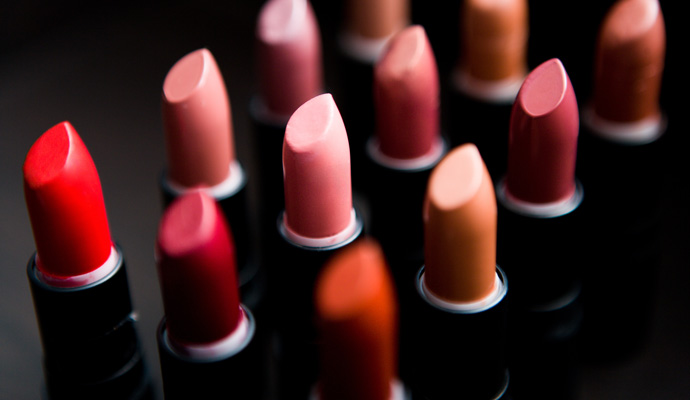Can your makeup kill you?
Arguments about "all natural" cosmetics can become very emotional

A free daily email with the biggest news stories of the day – and the best features from TheWeek.com
You are now subscribed
Your newsletter sign-up was successful

In the world of cosmetics, we pay a premium for "all natural" and "organic" products. Regular lipstick usually costs in the range of $5 to $8. "All Natural" and "Organic" lipsticks often range from $9 to $25. The luxurious NVey Eco lipstick costs $28. It is both "natural" and "organic", and contains safflower, beeswax, and organic castor oil.
But what does "all natural" mean? What does "organic" mean? Should products that are only partially "organic" be allowed to use the term? Can we impose penalties on companies that claim to be "all natural" when they don't fit the definition?
These arguments can become very emotional. Consumer watchdog agencies throw around terms such as "fraud" when they think a company implies that their products are natural despite having one or two synthetic ingredients, and brands spend huge amounts of money to ensure that any legislation restricting the use of words such as "organic" and "natural" will allow them to keep using them, while hopefully preventing their competitors from doing the same.
The Week
Escape your echo chamber. Get the facts behind the news, plus analysis from multiple perspectives.

Sign up for The Week's Free Newsletters
From our morning news briefing to a weekly Good News Newsletter, get the best of The Week delivered directly to your inbox.
From our morning news briefing to a weekly Good News Newsletter, get the best of The Week delivered directly to your inbox.
These battles are a gigantic focus of attention among scientists and marketing organizations alike because consumers prefer to buy products that claim to be "all natural". Not only do they prefer to buy these products, they are willing to succumb to ridiculous price hikes just to use products that have these prized words on the box.
Is it all worth it?
All-natural hype and histrionics
If you are looking for cold, hard, dispassionate facts, it is difficult to take most websites that advocate for organic and all-natural cosmetics very seriously.
A free daily email with the biggest news stories of the day – and the best features from TheWeek.com
Just as an example, consider a quote from Gillian Deacon, award-winning broadcaster and author of There's Lead in Your Lipstick: Toxins in Our Everyday Body Care and How to Avoid Them, who has been interviewed widely as an advocate of all-natural cosmetics.
A blog called "The Queen of Green" asked the key question: Is expensive "all natural" make-up any better than cheap CoverGirl make-up?
Deacon replied this way:
It's worth paying more for truly natural ingredients. Synthetic chemicals are cheaper, which is why most manufacturers use them. But that's all we know about them. No testing is required on those ingredients, so it's anyone's guess how they affect our long-term health. Increasing evidence links those chemicals with many health concerns.
Don't put yourself or your family at risk of serious health problems just to save a few bucks. Having gone through breast cancer treatment, I don't say that lightly! [There's Lead in Your Lipstick]
This response is typical of all-natural and organic cosmetics advocates. But it is worth paying attention to what this well-practiced answer does not say. It does not say that using synthetic cosmetics leads to negative health outcomes, only that the ingredients have been "linked" to health "concerns". It does not say what types of "links" or "concerns" are involved. It also does not explain whether "increasing evidence" means a massive accumulation of dozens of studies, or an increase from one study to two studies in the past 10 years.
Her response is deliberately vague, in fact. Essentially, the argument is: Nobody has proven to me that synthetic cosmetics are safe, therefore we should assume that they are not. The unstated argument is: Nobody has "proven" that all-natural and organic cosmetics are safe, either, but they should be given the benefit of the doubt because they are "natural".
The point of this example is not to pick on Deacon. Across the marketing pamphlets, television commercials, and websites worldwide, the arguments for all-natural and organic cosmetics tend to read like propaganda. Synthetic make-up may be related to cancer! Synthetic make-up could be a risk. Synthetic make-up might be harmful.
There is some evidence that some ingredients might cause some problems in some concentrations… therefore, you better not take the chance! Is that really the best these guys can do?
The case against synthetic makeup

I put the following question quite bluntly to Dr. Janet Gray, a research scientist who has investigated the risks of chemicals in cosmetics and written extensively on the topic for the Breast Cancer Fund website.
"I think your concerns are important, but you might be looking for too definitive of a response," Gray warned me. "We do know — from hundreds of scientific studies — that many of the chemicals in a lot of cosmetics/personal care products (we are talking more than make-up with these terms) have been linked to negative health outcomes, including reproductive and neurodevelopment disorders, infertility, cancer, asthma, and other diseases."
As we discussed the details, a number of specific examples came up. Chemicals such as parabens, sulfates, and phthalates have been tied to possible increased cancer risks, although many experts insist that this evidence is still very weak. None of the risk was associated with cosmetics, per se, either: Only with individual chemicals that happen to be found in make-up.
There is evidence that exposure to synthetic musks can have hormone-disrupting effects. Galaxolide and Tonalide can bind to and stimulate human estrogen receptors, and both musks have been shown to affect androgen and progesterone receptors. Even more alarmingly, Tonalide has been reported to increase the proliferation of estrogen-responsive human breast cancer cells.
But have there been any studies that have actually shown that the use of cosmetics that contain tonalide leads to an increased probability of cancer, or any other health disorder?
There have not, but Gray does not believe that this matters:
When we have scientific evidence that demonstrates that common ingredients in personal care products are associated with negative health impacts, I think it is really important that the public has resources to educate them about these issues and that products are fully labeled so people can make informed decisions. [Gray]
Educating people is always good. But before we warn people away from synthetic cosmetics, shouldn't there be some evidence that the use of those cosmetics themselves actually leads to a higher probability of cancer, or some other negative health outcome?
Gray believes that that would be demanding too much. "It is impossible to say that using a particular lipstick or lotion or or shampoo or perfume will cause illness in an individual," Gray observes. "But it is also impossible to say that smoking cigarettes will cause lung disease in an individual."
The comparison to smoking and lung cancer is an important critique to consider. There are too many times when people will use the "not enough proof!" argument with an ulterior motive. Fringe religious groups always claim that there is "not enough proof" for evolution or global warming, although they never state what "enough proof" might mean.
Very famously, the tobacco industry clung on to the idea that there was "not enough proof" for the link between smoking and lung cancer until well into the 1990s. Are those who question the link between synthetic cosmetics and cancer falling into the same trap?
The evidence against cigarettes
The simple answer is "no".
Decades of study have shown that there is a very concrete and measurable increase in the probability that a person who smokes will get lung cancer, compared to the probability that a person who does not smoke will get lung cancer. Specifically, people who do not smoke have approximately a one percent chance of getting lung cancer, while people who smoke have approximately an eight percent chance.
Pro-smoking advocates still argue, of course, whether an eight percent chance is high enough to say that smoking "causes" lung cancer; however, semantic quibbling aside, there is a clear statistical link between the act of smoking and the fact of lung cancer.
This type of study is notably absent from the arguments of organic and all-natural makeup advocates. There are studies that demonstrate that some ingredients can cause chemical changes in the body under laboratory conditions, or that some ingredients in isolation have been linked to certain physiological responses or risks.
However, there is no broad-based study showing that the actual use of these products is linked to an actual negative health outcome.
So, just to be clear: The level of "evidence" that synthetic make-up causes health problems is nothing remotely close to the level or kind of "evidence" that smoking causes cancer.
Chemophobia

One might argue that the only reason the evidence does not exist is that we still need more time to gather it. It could be that in 40 or 50 years, the evidence against synthetic makeup will be overwhelming and damning. Moreover, based on the chance of that possibility, you may decide that you want to pay more for all-natural makeup.
That is your choice. But you should be aware that it's not a rational decision. It is not based on science. Because, at its core, the fear of synthetic makeup is based on chemophobia.
There are plenty of chemicals that people once worried about because they were "unknown". Many of these chemicals have turned out to be completely harmless, with famous examples being fluoride and metals in water, and vaccinations. Paranoids and conspiracy theorists still fret over things such as fluoride and vaccination because the irrational fear of unknown chemicals can be hard to shake.
There are people for whom it will never be possible to "know enough" about a man-made substance for them to believe that it is safe.
But this mindset is obviously illogical. Herbs, flowers, and other all-natural cosmetic products can produce allergic reactions much more severe than any demonstrated effect of synthetic ingredients in cosmetics.
The simple fact is, every time you put on any kind of makeup or beauty product, you are incurring a risk. It is the normal level of day-to-day risk that everyone lives with all of the time. There might be an increased risk associated with synthetic cosmetics, but there might not be. So far, there is no good scientific reason to think that there is.
If you are that worried about it, your best bet — and your cheapest option — is to simply not use cosmetic or skin-care products at all. Although that also comes with its own risks.
More from The Kernel...
-
 The environmental cost of GLP-1s
The environmental cost of GLP-1sThe explainer Producing the drugs is a dirty process
-
 Nuuk becomes ground zero for Greenland’s diplomatic straits
Nuuk becomes ground zero for Greenland’s diplomatic straitsIN THE SPOTLIGHT A flurry of new consular activity in Nuuk shows how important Greenland has become to Europeans’ anxiety about American imperialism
-
 ‘This is something that happens all too often’
‘This is something that happens all too often’Instant Opinion Opinion, comment and editorials of the day